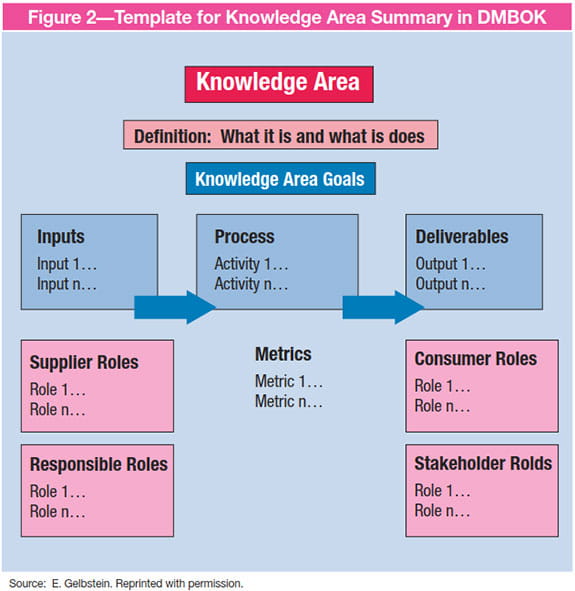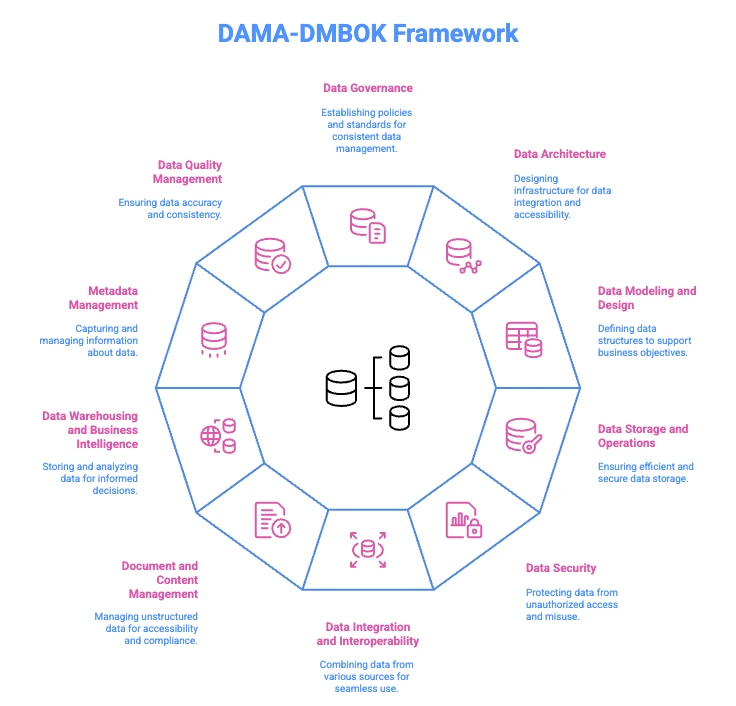Data Management Body of Knowledge
(2025-10-01T14:29.960Z)
Perplexity Query
(2025-10-01T14:29
.960Z)
Question:
Write a comprehensive one-page article about "Data Management Body of Knowledge".
Model: sonar-pro
The Data Management Body of Knowledge (DMBOK) is a comprehensive framework developed by DAMA International to provide organizations with best practices, principles, and standardized guidelines for managing data as a strategic organizational asset.
[qg77zd]
[d90221]
As the volume and complexity of data grow exponentially in the digital era, DMBOK serves as a critical resource for improving data quality, accessibility, and governance, empowering organizations to derive maximum value while minimizing risk.
[qg77zd]

Understanding the Data Management Body of Knowledge
At its core, the DMBOK comprises ten to fourteen knowledge areas that span every facet of enterprise data management, including data governance, architecture, modeling, storage, security, integration, content management, master and reference data, business intelligence, metadata, and data quality.
[qg77zd]
[d90221]
[beo815]
For example, the data governance area establishes standards and policies to manage data effectively throughout its lifecycle, ensuring accountability and stewardship across the organization.
[d90221]
Meanwhile, data quality management focuses on ensuring the accuracy, completeness, and reliability of organizational data, directly impacting business decisions and operational efficiency.
[b3ng16]
Practical examples of DMBOK application include designing enterprise data architectures that break down organizational silos, setting up master data management programs to maintain unified customer records across departments, and implementing data governance policies that ensure compliance with regulations such as GDPR or HIPAA.
[qg77zd]
[beo815]
In the finance sector, for instance, applying DMBOK practices can streamline regulatory reporting and reduce the risk of costly compliance violations. Retail companies use DMBOK principles to develop robust customer data platforms, linking online and offline data sources for a unified customer view.
The benefits of DMBOK adoption are substantial:
- Establishes a common language and set of definitions across IT, business, and data teams, reducing miscommunication and facilitating collaboration. [d90221]
- Enables consistent and repeatable processes for data quality improvements, risk mitigation, and regulatory compliance. [beo815]
- Offers a vendor-neutral, industry-agnostic perspective, making it suitable for organizations regardless of their existing technical stack. [d90221]
- Enables organizations to map process maturity, allowing them to benchmark current capabilities and plan strategic improvements over time. [d90221]
However, implementing DMBOK also presents challenges, such as the cultural change required to prioritize data stewardship, the need for executive sponsorship, and aligning existing workflows and roles to the DMBOK model.
[d90221]
[beo815]
Successful adoption often requires phased implementation, ongoing training, and clear communication of value to stakeholders.

Current State and Trends
Adoption of the DMBOK framework is increasing across sectors such as finance, healthcare, government, and retail, as organizations realize the critical importance of data governance and quality in digital transformation initiatives.
[d90221]
Key players driving adoption include DAMA International—the non-profit body that maintains and updates the DMBOK—and leading organizations that have incorporated DMBOK principles into their enterprise data strategies.
Recent developments include the publication of updated DMBOK editions—such as DMBOK2—that address emerging topics like big data, data ethics, and artificial intelligence, ensuring continued relevance in a rapidly evolving data landscape.
[beo815]
[b3ng16]
Modern data management platforms, cloud data warehouses, and data cataloging solutions are increasingly aligned with DMBOK best practices, supporting automation and scalability.

Future Outlook
As data volumes grow and regulatory demands tighten, the role of frameworks like DMBOK is expected to expand. Future developments will likely emphasize data ethics, AI-driven data management automation, federated data governance for multi-cloud environments, and integration with real-time analytics platforms.
[beo815]
[b3ng16]
Organizations that embrace and regularly update their data management practices using DMBOK will be better positioned to leverage data as a core business asset, gaining a competitive edge in innovation, compliance, and customer experience.
By providing a unifying framework, the Data Management Body of Knowledge enables organizations to move beyond piecemeal data efforts and build a more flexible, resilient, and data-driven enterprise. As the data landscape continues to evolve, adherence to DMBOK will remain a key strategy for managing complexity and unlocking new value.
Citations
[qg77zd] 2025, Oct 01. DAMA-DMBOK: A Comprehensive Framework for Data Management. Published: 2024-10-30 | Updated: 2025-10-01
[d90221] 2025, Oct 01. DAMA DMBOK Framework: An Ultimate Guide for 2025 - Atlan. Published: 2025-05-26 | Updated: 2025-10-01
[beo815] 2025, Oct 01. DMBoK: What Is It and Why Is It Important? - Dataversity. Published: 2022-04-15 | Updated: 2025-10-01
[b3ng16] 2025, Sep 19. Review of the Data Management Body of Knowledge (DMBOK). Published: 2014-02-22 | Updated: 2025-09-19
[5]: 2025, Sep 30. What is Data Management? - DAMA International®. Published: 2025-05-27 | Updated: 2025-09-30